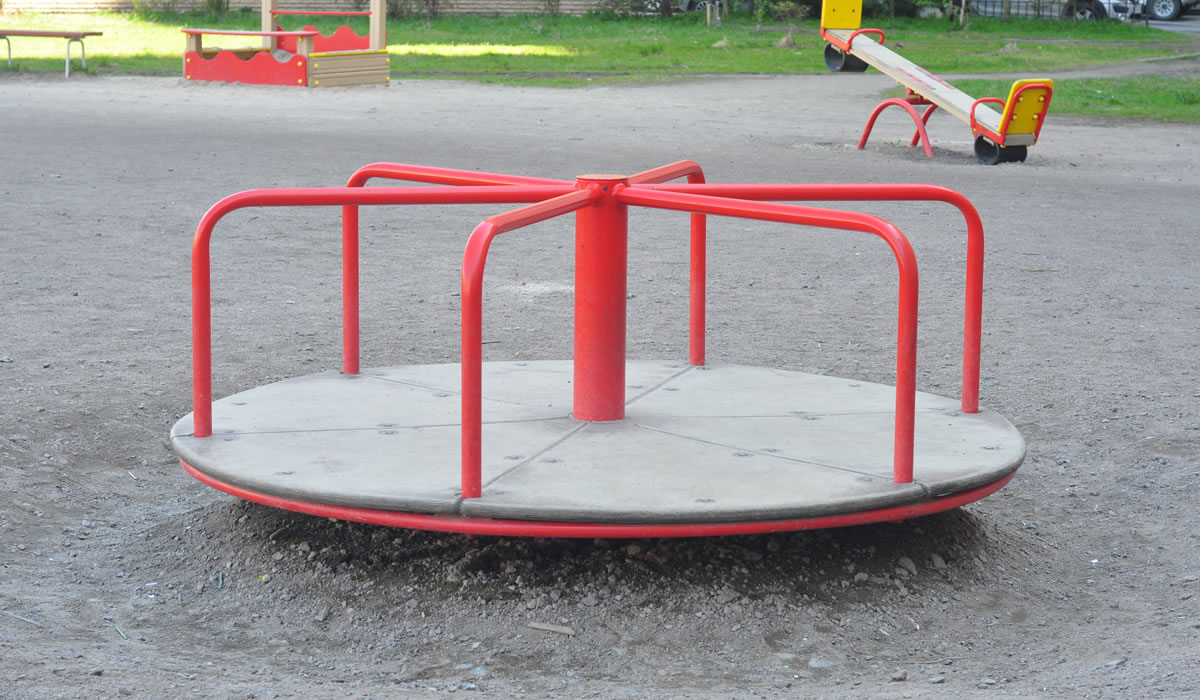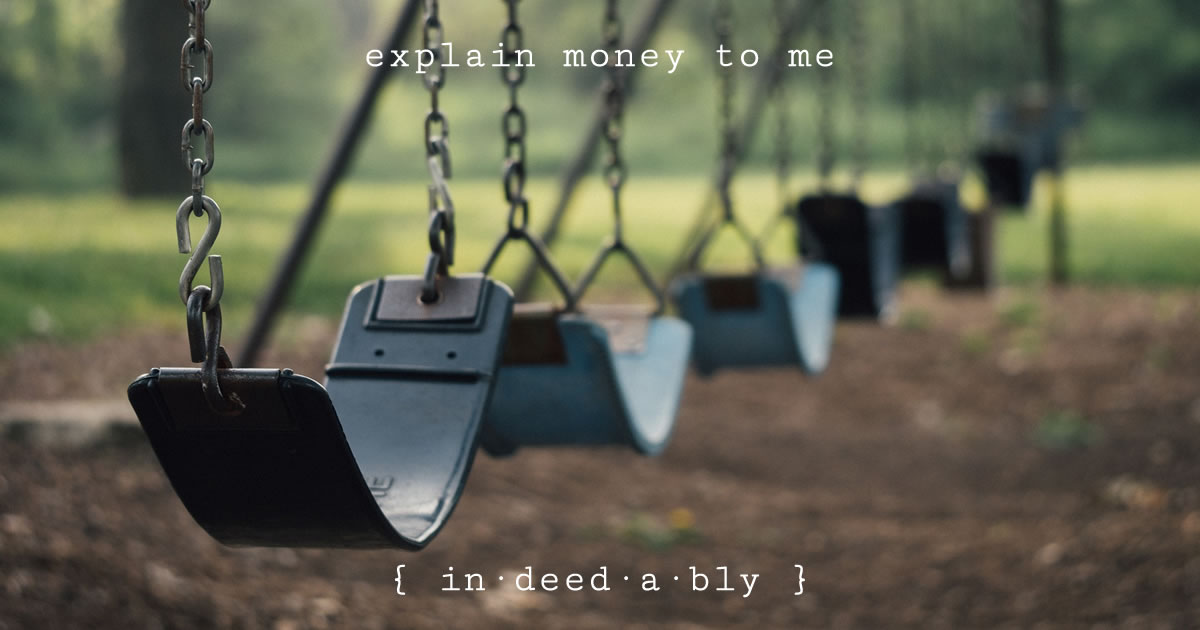“Explain money to me” my elder son demanded, as we walked through the park on the way home from school.
I raised a questioning eyebrow.
“Money. Explain it to me. Please” he repeated. “School focuses on the wrong things. Teaches them badly, at the pace of the slowest or most disruptive kid. Then sets too much homework because they don’t get through everything in class. I want to learn about the things that matter. Like money.”
“I want to learn about money too!” his younger brother declared.
I looked from one to the other.
The elder boy’s brain would be frazzled from another long day at high school, busy yet unstimulating. The younger boy was about ten minutes away from becoming hangry for his dinner.
That combination created a demanding audience with a short attention span, who desired a simple message to understand a complicated subject. Sigh, no pressure then. The story of my life!
Fun and games
We paused beside the seesaw at the playground.
A long beam mounted on a central pivot. Which two happy children, one seated on each end of the beam, could alternately push off the ground and launch their friend up into their air, then be launched themselves in turn. Using only their body weight. Enthusiasm. And a little bit of applied physics.

Seesaw. Image credit: Manfred Antranias Zimmer.
I asked the older boy to empty out his heavy school bag, and the younger one to put it on his back.
Then I asked the little boy to stand on the seesaw and balance the beam, so that it remained parallel to the ground. Weight evenly distributed. Pressure the same on both sides of the pivot.
He wobbled backwards and forwards attempting to get the beam level, then shouted victoriously as the beam precariously levelled off.
I pointed to one end of the seesaw. That end was spending. The other end was earnings.
At the moment they are in balance, neither side greater than the other. When it comes to money, this resembles how many of us start our journey. We don’t earn any money, but that is ok because we don’t spend any money either.
Spending
But then we start to want things.
Food.
Warmth.
A safe place to sleep.
Wifi.
Those things cost money. Groceries. Heating bills. Rent. Broadband.
As I called out each expense, I lifted one end of the seesaw, so that the expenses end got closer to the ground. My son wobbled. Tilted. Windmilled his arms like a drunken surfer. Then slid down the beam and tumbled onto the ground.
“Hey!” he protested, shooting me a death stare capable of dropping pigeons from the air mid-flight.
I asked what happened as I added each expenditure?
The elder boy thought about it. “The incline of the beam got steeper with each increase in spending, making it harder to stay on top of”.
I nodded. This represented a situation where our expenses exceeded our earnings. Setting us up for a constant uphill battle.
Consumer debt
The younger boy was determined not to be defeated by the inclined seesaw. He clambered along the length of the beam from spending towards earnings, whooping in delight as he leapt from the top.
Now imagine we have borrowed money to buy things that we cannot afford today.
An education.
A car.
A house.
Toys.
Each of those things costs money. Tuition fees. Lease fees. A mortgage. Credit card payments.
As I called out each debt, I added a heavy item into the backpack the younger boy was wearing. A maths textbook. A Spanish/English dictionary. A huge hardback copy of William Shakespeare’s combined works. A full water bottle.
The younger boy hadn’t really noticed the empty backpack he was wearing previously.
Now the weight of it caused him to stoop forward uncomfortably.
I asked him to repeat the climb now that he was burdened with the additional load of all that debt.
He took a couple of tentative steps up the inclined beam, then slid back down.
Next, he tried to run up the beam. Almost reaching halfway before toppling off and landing with a thud.
Finally, he dropped down to hands and knees and shuffled along. It was a struggle, but eventually he reached the top once more.
I asked what happened as I added each additional debt?
The elder boy responded, “The heavier the load, the more difficult the climb became. He had to work more than twice as hard to reach the top this time. When the weight proved too much, he fell down and busted his head”.
Judging by the new red mark on my younger son’s forehead, his landings needed some work!
I nodded again. Debt is borrowing from our future selves. Enjoying something today that the future me will have to do additional work to pay for.
Earnings
I explained that the more money we earn, the easier our journey becomes.
There were lots of different potential sources of income.
Wages.
Dividends.
Rent.
Interest.
These came from working, saving, investing, or running a business. Each requires varying degrees of upfront effort and ongoing time investment.
My younger son began the climb once more. As I rattled off the different income sources, I lessened the incline until the beam was level once more. This time he was able to walk up rather than needing to crawl.
I asked what happened as I increased earnings?
The elder boy thought about it for a moment, then tentatively said “The journey got easier. As earnings closed the gap to spending, the journey took less effort to complete”.
I nodded yet again, starting to feel a bit like a bobblehead.
After removing the heavy backpack from my younger son, I got him to sit at the expenses end of the now level seesaw.
An interesting thing happens when our income begins to exceed our spending. The greater the difference, the faster we go.
As I spoke I steadily lowered the end of the beam, so that my son slid from expenses towards earnings. Starting slowly, and gathering speed until he came to a graceful stop at my feet.
“Woohoo! That was fun, can I do that again?” he cheered.
Leverage
Once he had scrambled back onto the spending end of the beam, I handed him the heavy backpack of debt to hold.
On the next ride, the little bloke slid down the beam clutching the backpack. He travelled at a much faster rate, gathering speed, until he shot off the end and skidded across the ground on his backside.
I asked the older boy how debt might be used to accelerate the journey.
He puzzled it out, “Earlier you said debt made things harder, because our spending increases to pay for our debts. Now you’re saying it can help. But that would only make sense if the thing we used the debt for generated more earnings than it cost us in spending to repay”.
I nodded. Too much leverage creates danger. The risk of travelling too fast, crashing out, or blowing ourselves up. Using just enough can help us reach our destination significantly faster than may otherwise be possible.
Progress, not repetition
We packed the elder boy’s remaining school stuff into his bag, then walked over to the roundabout.
The little boy climbed onboard the platform, and begged us to spin it around. After instructing him to hold onto the railing, so he didn’t end up with matching pair of red marks on his head, I asked my elder son to join him as I started to spin the roundabout.
As I did so, I explained that the roundabout was a lot like our relationship with money.

Roundabout. Image credit: Reda Kerbouche.
For many, it can feel like they go endlessly around in circles, earning and spending, going faster and faster without ever making tangible progress towards their goals.
After dozens of rapid spins, I stopped the roundabout and told the boys to run towards the swings.
The little one lurched across the playground like a university student in freshers week, giggling the whole time until he fell over.
The elder one went at a more measured pace, weaving an erraticly scenic route in the general direction of the swings.
I asked how that had felt?
“Fun!” shouted the younger one, his eyes rolling around inside his head like a cartoon character.
“Fun at first” clarified the elder boy, “then the spinning made me dizzy. Now I can’t think straight and feel sick”.
I nodded. Many people engage in lots of busywork. Frantically active, yet achieving little of value. This can be counterproductive, getting in the way of them achieving their goals because they make themselves too tired, time-poor, or ill by working hard rather than working smart.
Keep calm and carry on
All three of us sat on the swings.
As we pushed off, I asked them to focus on how the effort they expended changes throughout the ride.
The elder boy narrated.
“At first we have to work hard to get going. The initial push made little progress. As we swing backwards and forwards our momentum grows. Pretty soon we are swinging high, without needing to think about it, or do anything more than adjust our balance”.
I nodded once more. The early steps are the hardest. Requiring lots of effort, with little apparent tangible progress.
Over time, each successive activity builds upon those that came before. Compounding achievement and accelerating progress.
Once we have the basics in place we start to soar higher and higher.
Our actions on autopilot, our progress driven largely by momentum alone.
Money work in a similar way.
The more we sensibly invest, the greater our earnings become. This allows us to purchase even more investments in turn, and so we progress.
Automation
Before long, my low tolerance for boredom exceeded my enjoyment gained from playing on the swing. I instructed the boys to jump off the swings at the count of three.
One. Two. Three. Jump!
We leapt into the air.
My elder son stuck his landing with the grace of a gymnast.
I took a stumbling step upon hitting the ground. The absence of style offset by determination.
The younger boy performed some bizarre form of commando roll. If the laughter involved was anything to go by, it may have been intentional.
We turned and watched the swings continuing to arc backwards and forwards without us.
I pointed out that money makes money.
As we acquire sources of investment income, over time our earnings will continue to grow without our needing to expend additional effort. Allowing us to buy back our time previously spent working, and affording us the luxury of choosing how we might otherwise invest that time.
Perhaps spending it on things we enjoy, such as playing, or hanging out in the park with loved ones.
Heading home, the younger boy said “That was fun. I didn’t know we could get rich by playing!”
The elder one corrected him. “Most people can’t. That said, the richer you get, the more time you can afford to spend playing”.
I corrected them both.
The wealthier you feel, the more comfortable you will be investing time in things you enjoy. That feeling of wealth is not derived by your the contents of your money box, but by how much your earnings exceed your spending.
“I liked the holiday park better. It had waterslides, laser tag, and go-karts” lamented the younger boy.
I pointed out that while those things were all fun, their absence didn’t make the local playground any less enjoyable.
How content we feel about our wealth is heavily influenced by what we choose to compare it to. Aim too high, and forever feel wanting.
I explained that if they could get those two aspects of how they felt about money right, then they would have won the game.


GentlemansFamilyFinances 20 September 2020
Great story but is any of it true?
{in·deed·a·bly} 20 September 2020 — Post author
You don’t want to spoil a good story with facts, GFF!
Truth is, my elder son used some much saltier language when describing his school frustrations. I didn’t really stick the landing off the swings, my dismount was more of a stumble, skip, and crash into the fence. And we left the park because the younger one got hangry, rather than my getting bored (though it was a close run thing).
BLAINE k WHEELER 20 September 2020
Brilliant !! Thank you
{in·deed·a·bly} 20 September 2020 — Post author
Glad you liked it, thanks Blaine.
John Smith 20 September 2020
&
Excelent summary, thank you! More simple than words such as “when it is enough, stoicism, serendipity, self-reliance, not keep up with Joneses, etc”
{in·deed·a·bly} 21 September 2020 — Post author
Thanks John Smith.
David Andrews 21 September 2020
Sounds like similar conversations I have with my 6 year old son. He knows that we have enough for anything ( within reason ) but not for everything. Choices have consequences ( the joy of opportunity cost ). He knows that if he wants ice cream for pudding then we need to go for a walk to burn off some energy. He knows that if he wants 20 minutes of mind rotting you tube on his tablet then that means those 20 minutes can’t be used for other activities and he needs to do his reading book(s) first. He knows that Daddy was able to take a month off unpaid over the summer holidays and not worry about it. He desperately wants a Nintendo Switch but I’ve attempted to tell him that for one Nintendo Switch game he can get about 4 Wii U games. Sadly he continues to advise me that the Nintendo Switch is much better. That particular discussion will continue for some time.
{in·deed·a·bly} 21 September 2020 — Post author
Sounds like a wise approach David.
Beware the trap for young players when the opportunity cost discussion collides with the “Daddy was able to take a month off unpaid over the summer“.
What the young child observes is a parent now available to interact and play more often, and nothing obviously being done without.
They absorb that as a good thing, revelling in the additional attention.
When the parent subsequently returns to work, that attention suddenly diminishes, but with nothing positive that they can see being gained in return.
You and I both understand about lags and long tail events, but kids have shorter memories and struggle to perceive the less immediate cause and effect relationship. Instead, they can (quite reasonably) feel that their parent has made an opportunity cost decision to put something else (i.e. work) above spending time with their children.
While factually correct, they may not understand that you had to “save up” to be able to afford the time off, and that once those savings were exhausted you needed to return to work or there wouldn’t be food on the table or a roof over their heads.
That has been my experience each time my winter working hibernations come to an end, your mileage may vary.